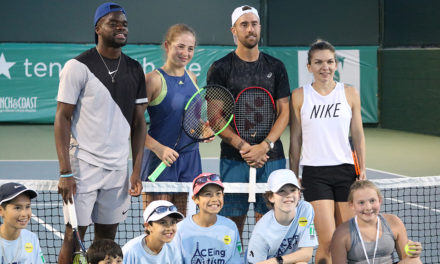Troon Reports
Looping in Langston
Next Generation Caddies grow in D.C.
By Tom Mackin
Caddies have long been a part of the rich course history at Langston Golf Course in Washington D.C. The most famous alum? Richard “Jelly” Hansberry, who went on to caddie professionally for PGA Tour players including Lee Elder, Charlie Sifford, and Jim Thorpe.
But looping fell off the radar there sometime in the 1970s, remaining largely a relic of the past until four years ago, when the National Links Trust (NLT) took over the operations of Langston, Rock Creek Golf Course, and East Potomac Golf Links, with Troon managing the trio of public courses.
That’s when Craig Kirby stepped into the picture. The founder and CEO of the community-based organization called Golf. My Future. My Game., was inspired after attending a Western Golf Association Evans Scholar Program event in Michigan. “I was sitting there that day listening to kids who worked as caddies and were applying for that very selective, full tuition scholarship worth up to $125,000,” he said. “I thought, ‘I‘ve got to bring this opportunity to Washington D.C.’ The historic Langston Golf Course was the course I wanted to use.”
Kirby, along with Ben Foster at Langston and Jimmy Garvin at Rock Creek, re-started a caddie program. “We really had no idea what we were doing, but then we had the great fortune of Kendall Murphy from Troon getting involved last year,” he said. “That connected us with CADDIEMASTER, which resulted in the creation of a Caddie Immersion program to train kids as new caddies.”
The initiative provides students from diverse backgrounds with hands-on caddie training and invaluable insights into the business side of caddying. Last summer’s initial group of 15 kids between the ages of 12 to 17 came from all over D.C. to Langston. They watched course etiquette and safety videos, learned how to both carry a golf bag and forecaddie, and worked on their communication skills.
Jack Eggleston and Nick Hill, professional caddies from Congressional Country Club in Maryland, shared their experiences and expertise, working with the kids on the course at Langston and going through real-life scenarios over multiple days.
Real Life Skills
“In my 17 years with CADDIEMASTER, the initial session of the Caddie Immersions program was the most rewarding and fulfilling day I ever had,” said David Assise, vice president, operations. “It was that powerful. Now I get calls from managers at other courses who want to be part of the program. We’re trying to show the kids that even if you don’t want to go to college, you could build yourself a career, like myself, Jack, and Nick have all done. When you see someone’s eyes light up because of a passion for golf, and you’re feeding that passion, it’s the most incredible thing.”
Ben Foster can tell right away which kids will last as caddies beyond the training program. “Those ones are eager to work,” he said. “A lot of the kids come to just play the course and they don’t have much in terms of social skills. A caddie has to interact with people. If they are not afraid to talk to people, and are hungry to make money, they will usually stick with the job.” The majority did, with two becoming skilled enough to work a few rounds at Chevy Chase Country Club. Another, Bethuyna Dahmani, earned an Evans Scholarship, which she will use to attend Rutgers University in New Jersey. She is the first caddie from a municipal golf course in the District of Columbia to receive that prestigious scholarship since it was introduced in 1930.
“Through this program, we witnessed the transformation of these students’ worlds and minds as they were introduced to the golf industry,” said Troon’s Director of Diversity, Equity & Inclusion, Kendall Murphy. “The acquisition of life and customer service skills has been truly invaluable. I extend my heartfelt appreciation to Craig Kirby for identifying these remarkable students, and to Ben Foster for his exemplary role as caddie master at Langston and as a mentor. Their dedication to guiding these diverse students through life using the game of golf is truly commendable.”
Ultimately, Foster says the job of caddying can be a way of preparing teenagers for life. “It’s giving you the ability to communicate and present yourself in a manner that people admire and make them want to help you in the future,” he said. “We could do this nationwide at municipal courses. It can be a revenue source for these kids, an educational opportunity with potential scholarships, and a chance to build life skills. I’m hoping these kids will train the next round of kids, too. Once the NLT courses complete the planned renovations, I’m looking at possibly having caddies at all three of the courses.”









